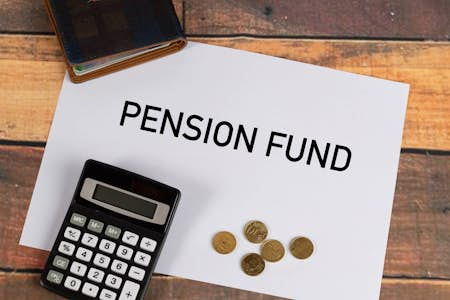Just as not all superheroes wear capes, not all crooks and fraudsters wear masks. Many people believe "fraudsters and scammers" live in the shadows when this is not the case. They can look like a bona fide pension adviser, only for you to find they are an unregulated financial adviser and that limited, if any, protection applies.
Unfortunately, it can be tempting to let your guard down when talking to an unregulated financial adviser who could potentially open you up to pension fraud.
Maximise your retirement fund with our panel of pension providers. Click on your chosen provider to get started!
If it looks too good to be true
Before we look further into the finer details of pension scams, one fact remains:
“If it looks too good to be true, then it probably is too good to be true."
When somebody promises to unlock your pension assets early or release much-needed funds while creating significant returns on remaining investments, it can quickly turn your head. However, we need to look at the rules and regulations to protect you and your pension assets and the warning signs of bad pension arrangements.
The typical structure of pension scams
It is not difficult to see why many people are attracted by the promise of high returns on their pension assets and early access to funds. As we approach retirement, funds can become tighter as we try to address our work/life balance. Unfortunately, over the years, we have seen many pension scams at work, with very similar characteristics, such as:
- Asking you to transfer your entire pension savings.
- Tempting you with a partial release of funds.
- Promises of high returns, which are just not feasible.
One common strategy taken on by unregulated financial advisers is to utilise the ever-growing list of new investment opportunities. As these investment opportunities are often in their relative infancy, and not an awful lot is known, this can sometimes prompt us to be drawn in. Some of the more unusual, potentially high risk/high return investments include:
- Renewable energy bonds
- Crypto-currencies
- Forestry
- Storage units
- Parking
- Overseas property
- Overseas recreational facilities
If you take each of those “opportunities” in isolation, rightly or wrongly, you could probably make an argument for investing yourself, let alone after listening to an unregulated financial adviser. It is not always evident that many of these markets have limited, if any, regulatory protection. Once you feel like an “adviser” is looking to tempt you away from traditional pension fund investments, this should start to ring alarm bells.
Warning signs
We all know the warning signs. We all know what to do. Yet, sometimes, it is only in retrospect that we can spot an unregulated financial adviser taking advantage. As discussed above, many pension scammers move with the times, keep up-to-date with investment ideas, and effectively blind you with science and detail.
However, even though we have seen pension mis-selling issues ongoing for decades, there are still many common traits.
Promises of high returns
We all want to increase the returns on our pension assets to make life more comfortable in retirement. But we should also know unfeasible high returns when we see them. Even if these investment opportunities exist, they often lack regulatory protection and involve undue risk. So start the alarm bells ringing! Pension savers should remember that investment scams often promise you the moon and the stars.
Cashing your pension early
As the UK government continues to push back the age at which the state pension is paid, cashing in your private pension early can be a desirable option. The truth is, unless you have a life-threatening medical condition, there is no way to cash in your pension fund assets early without, at best, taking a huge tax hit with your retirement savings.
Pressure selling tactics
Unfortunately, while one of the most common warning signs of a pension scam, time-related selling tactics still work. Time-limited offers are an unregulated financial advisers' way of rushing you, putting you under pressure and getting you to sign on the dotted line. Once you have signed on the dotted line, things can quickly unravel. When in doubt, take a step back, take a time out. If the deals aren't there when you return, were they ever there?
Complicated investment structures
Many of us blindly place our faith in the hands of financial advisers, not always aware of whether they are regulated or unregulated. The more dubious pension investment opportunities often involve an extremely complicated investment structure. This not only means you are effectively signing away your funds out of your control, but it puts an even greater distance between you and your pension assets. Be very careful!
Long-term or locked-in pension investments
While some unregulated financial advisers may look the part, talk the talk and offer what seems like a viable investment, this is not always the case. We often hear talk of long-term pension investment opportunities that may take "years come to fruition," which usually come with a limited access period. Unfortunately, by the time many people come to cash in these investments, they realise they are long gone.
Emotive phrases
There is no such thing as a free lunch in the business world, and this is very much the case in your private financial life, too. Those looking to part you and your pension fund assets will often be very persuasive using an array of expressive phrases such as:
- Pension loans
- Tax loopholes
- Pension liberation
- Free pension review
- Cashback
- Early access
- Avoiding tax
- Your pension assets
- Financial freedom
- New regulations
- You would be crazy not to….
It is easy to see where the unregulated financial advisers are coming from; they use words that empower you and grab your attention. They will then question whether you "deserve early access to your pension fund?" Loading the gun and waiting for you to fire the first shot to financial salvation.
It isn’t difficult to see how people can fall for these aggressive and dynamic sales tactics. The key is to give yourself a time out, think straight, take advice, and consider all of your options. If a “financial adviser” refuses to give you any time to make a decision, this in itself is very dubious. So be very careful how you tread!
Trustees and administrators
Whether you have a personal pension or pension with your employer, there are numerous protections for pension assets in the UK. While many people may see trustees and administrators as an "additional cost", this is not the case. They are there to help you, direct you and ultimately offer an added layer of security between your pension assets and unregulated financial advisers.
The role of pension trustees and administrators has changed dramatically over the years. Many are now proactive, and whether you are enrolled in a private pension scheme or employer pension scheme, they will make you aware of:
- The risk of pension scams
- The need to take pension advice
- Potential high-risk transfers
- Concerns after pension transfer due diligence
Pension trustees and administrators have a legal obligation to protect your pension fund assets and ensure that you abide by the law. In their position, if they were to sanction an inappropriate pension transfer, they could be held legally liable. So, you should see pension trustees and administrators as your gatekeepers, not another obstacle to navigate.
Financial advisers
Even the quickest "financial adviser" Google search will show thousands of options. Therefore, it can be tough to know who you are dealing with, the degree of regulatory protection, and whether they are an experienced or qualified adviser. Therefore, you must make full use of the information and services available via regulators, such as the Financial Conduct Authority (FCA) or Moneyhelper's Pension Wise.
The FCA offers two vital services on their website, allowing you to spot signs of a pension scam and see whether an adviser is regulated via the FCA register. The FCA warning list is a helpful tool to combat potential scams. If you have any questions or queries, you will find the following two website links handy:
It is fair to say that the internet has changed how the UK financial services industry operates. Many services and companies are now much more transparent, and there are paper trails aplenty when researching. When offered a deal that looks "interesting," it is vital that you take time out, explore the options and, more importantly, the company or individuals offering to act on your behalf. Do not get railroaded into signing up without taking time to reflect!
Tax registered pension schemes
HMRC is heavily involved in the UK pensions industry, providing tax relief on pension fund contributions. Consequently, all new pension schemes need to apply to HMRC for approval, offering another layer of protection for consumers. All schemes approved by HMRC are continuously monitored to ensure they abide by the rules and regulations. Sanctions can be introduced very quickly where there is concern about unauthorised advice or activity.
Digging deeper, the administrators and trustees of approved UK pension schemes are also obliged to protect your pension assets. Of course, you can request a transfer to a third party by all means. Still, if the administrators or trustees have any reservations, they can confirm registration status with HMRC and even stop the transfer outright. You can also contact the Pensions Advisory Service for workplace pension schemes. Many people do not realise that administrators and trustees have a legal obligation to protect your pension assets, which can prevent them from being targeted by unregulated financial advisers.
Penalties and financial losses
Unfortunately, we have seen numerous occasions where unregulated financial advisers have targeted individuals to their financial detriment. In what is effectively a double whammy, you could find yourself in a situation where:
- Your transferred funds have disappeared.
- You are liable for tax penalties as a consequence of an unauthorised transfer.
The current tax penalty on unauthorised pension payments can be anything up to 55%, which would decimate your pension assets. In a situation where you have been the victim of fraud, not only could you have lost the transferred assets, but you would still be liable for any financial penalty. These are life-changing events, and you must take time and advice when considering any pension transfer.
Examples of financial scams/pension mis-selling
As we touched on above, the internet has prompted a positive revolution in the UK financial services industry. Unfortunately, however, it has also given firms across the globe access to your "living room," opening the door for unregulated financial advisers to commit fraud. There are numerous examples of fraudulent activity identified and acted upon by the FCA, including the cases highlighted below.
Unauthorised financial pension advisers
Thankfully, the FCA can investigate and make public statements regarding financial advisers operating in the UK without their authority. A recent example is The Pensions Club LLP, trading as "The Pensions Club", which the FCA believes to be operating without authority. As you will see from the link, this investigation has been ongoing since 2017, with regular updates released.
When dealing with unauthorised financial advisers, there is an increased risk that you could lose some or all of your pension funds. You should also note that your regulatory protection is reduced in this scenario. For example, you will likely not have access to redress via the Financial Ombudsman Service or the Financial Services Compensation Scheme (FSCS).
Coronavirus scams
Unfortunately, the Covid-19 pandemic has created the "perfect storm" for those peddling unauthorised financial advice. Due to restrictions on face-to-face meetings, many of us have been forced to stay at home. Consequently, when receiving a phone call or a text message from unregulated financial advisers, there can be a tendency to let your guard down.
While the current raft of scams relates to Covid-19, this is just one example of fraudulent activity due to significant events. Whatever the occasion, the tactics of unregulated financial advisers are very similar:
- Requesting upfront charges for their services.
- So-called "good cause" investments that offer incredibly high returns, which never emerge.
- Stock market volatility can be used to entice you to transfer pension assets into high return/high-risk investments.
In the current environment, we have seen many promises of high investment returns relating to the production of sanitiser, personal protective equipment, and drug research, for example. Unfortunately, the fraudsters tap into the empathy and willingness to help many of us feel.
Cloning legitimate, regulated financial advisers
Never underestimate the lengths to which scammers and fraudsters will go to get their hands on your pension assets. The cloning of legitimate, regulated financial businesses has seen a significant increase, rising by 29% in April 2020 compared to the previous month. During the calendar year 2020, the FCA reported that over £78 million was stolen from investors using the “cloned firm” tactic.
The average financial loss for those taken in by cloned companies averaged just over £45,000. To convince their victims, unregulated financial advisers will:
- Set up rogue websites based on regulated financial advisers.
- Use the same company name, address and authorisation numbers.
- Send out literature referring and linking to legitimate websites, creating an air of authority.
These websites and adverts can be highly professional, looking the part and have taken in many investors. So, if you are thinking of working with a new financial adviser, it may be sensible to check the contact details on the website are correct. This link will allow you to verify company addresses and contact details for regulated advisers with the pensions regulator.
It only takes minutes to click on the link and search for a financial adviser to see whether they are on the list. In reality, it probably takes less time than it does to make a cup of coffee!
Pension switching and transfers
When you consider that the UK has total pension fund assets of £2.5 trillion, this is a very lucrative area for unregulated financial advisers. In December 2020, the FCA fined LJ Financial Planning Ltd a total of £107,200. This fine related to:
- Unsuitable pension transfer advice.
- Unsuitable pension switching.
- Failure to correctly manage conflicts of interest.
You will see from the link below that a total of 114 customers were encouraged to transfer their pensions into self-invested personal pension assets. These assets totalled just over £6 million. However, it was subsequently found that the company failed to provide any advice on the underlying investments - some of which were found to be high risk and illiquid. This brings into play the "know your client" requirement, a central element of financial advice regulations.
As of December 2020, financial redress totalling just under £2.7 million had been completed for 41 customers, with others awaiting consideration. Unfortunately, a number of the investments acquired with the transferred pension funds were found to be worthless. While the FCA has taken action, and financial redress is still taking place, if the company fails, then claims for compensation should fall under the FSCS.
Non-advised annuity sales
Recent changes in pension regulations have brought in a greater degree of flexibility, with many people preferring to steer clear of pension income annuities. Interestingly, in 2019 the FCA announced a considerable fine of £23,875,000 for financial giant Prudential, relating to its non-advised annuity business. The FCA found the company was selling annuities directly to Prudential pension holders, often without explaining they may obtain better rates elsewhere.
It was also revealed that pension provider Prudential:
- Failed to take reasonable care to organise and control its affairs concerning the fair treatment of customers.
- Failed to ensure the documentation used by call handlers was appropriate.
- Failed to monitor calls with customers to an appropriate level.
The company did not dispute the FCA findings and penalty. As a result, approximately £110 million was put aside to cover financial redress for 17,240 customers. While currently undertaking a historic business review, changes have been made to internal procedures to the satisfaction of the FCA.
Protecting yourself from pension scams
While the scammers, fraudsters and unregulated financial advisers have become ever more ingenious in their attempts to part you from your pension funds, you can protect yourself. Be extremely wary of cold calls or contact through social media as well as promises of unrealistically high returns. Using the FCA website, it is straightforward to check whether an adviser is regulated and determine whether you are protected under UK financial regulations. You can also take advantage of the Action Fraud helpline or information from the Pension Scams Industry Group. However, never forget, if an offer looks too good to be true, then the chances are it probably is too good to be too.
You may have spent a lifetime building up your pension assets; make sure that you protect them!







